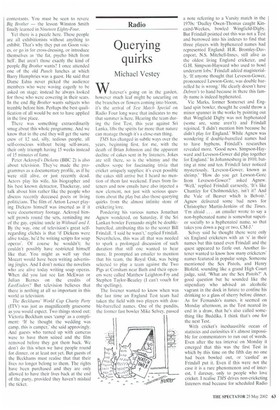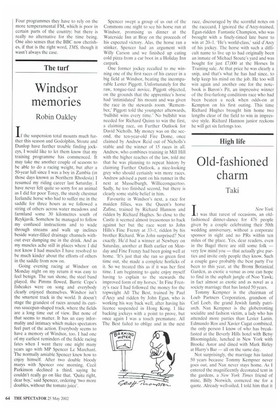Querying quirks
Michael Vestey
Whatever's going on in the garden, however much leaf might be uncurling on the branches or flowers coming into bloom, it's the arrival of Test Match Special on Radio Four long wave that indicates to me that summer is here. Hearing the team during the first Test, this year against Sri Lanka, lifts the spirits far more than nature can manage though it's a close-run thing.
TMS has changed in subtle ways over the years, beginning first, for me, with the death of Brian Johnston and the apparent decline of cakes sent in by listeners. Jokes are still there, so is the whimsy and the endless scope for fascinating trivia that cricket uniquely supplies; it's even possible the cakes still arrive but I heard no mention of them last weekend. Faxes from listeners and now emails have also injected a new element, not just with serious questions about the play but also those querying quirks from the almost infinite store of cricketing lore.
Pondering his various names Jonathan Agnew wondered, on Saturday, if the Sri Lankan bowler Fernando might be doublebarrelled, attributing this to the scorer Bill Frindall. 'I said he wasn't,' replied Frindall. Nevertheless, this was all that was needed to spark a prolonged discussion of such duration that still one wanted to hear more. It prompted an emailer to mention that his team, the Royal Oak, was being selected to play a team against the Two Pigs at Corsham near Bath and their openers were called Matthew Leighton-Fry and Stephen Taylor-Beazley (I can't vouch for the spellings).
The listener wanted to know when was the last time an England Test team had taken the field with two players with double-barrelled names. One of the pundits, the former fast bowler Mike Selvey, passed a note referring to a Varsity match in the 1970s: 'Dudley Owen-Thomas caught Kincaird-Weekes, bowled Wingfield-Digby. But Frindall pointed out this was not a Test and burrowed into his indexes to find that three players with hyphenated names had represented England: H.R. Bromley-Davenport, N.S. Mitchell-Innes, still alive as the oldest living England cricketer, and G.H. Simpson-Hayward who used to bowl underarm lobs.' Frindall added magisterially. 'If anyone thought that Leveson-Gower, pronounced Lewson-Gore, was double barrelled he is wrong.' He clearly doesn't have Debrett's to hand because in there this family name is indeed hyphenated.
Vic Marks, former Somerset and England spin bowler, thought he could throw a minor spanner in the works by pointing out that Wingfield Digby was not hyphenated (some are, some aren't) and Frindall rejoined, 'I didn't mention him because he didn't play for England.' While Agnew was wondering if double-barrelled names had to have hyphens, Frindall's researches revealed more. 'Good news. Simpson-Hayward and Leveson-Gower did play together for England.' In Johannesburg in 1910, batting at nine and ten. Frindall later noticed mysteriously, `Leveson-Gower, known as shrimp.' How do you get Lewson-Gore from Leveson-Gower?' asked Agnew. 'Well,' replied Frindall earnestly, 'It's like Chumley for Cholmondeley, isn't it? And the Vale of Beaver which is Belvoir.' Agnew delivered some bad news for Christopher Martin-Jenkins of the Times. 'I'm afraid .. . an emailer wrote to say a non-hyphenated name is somewhat superior socially to a hyphenated name, so that takes you down a peg or two, CM-J.'
Selvey said he thought there were only six England cricketers with an 'x' in their names but this taxed even Frindall and the quest appeared to fizzle out. Another listener wanted to know how many cricketers' names featured in popular songs. Someone mentioned the Sex Pistols, and Henry Blofeld, sounding like a grand High Court judge, said, 'What are the Sex Pistols?' A good question but he sounded like the stipendiary who advised an alcoholic vagrant in the dock in future to confine his drinking to a glass of sherry before dinner. As for Fernando's names, it seemed on Monday afternoon, as the Test neared its end in a draw, that he's also called something like Buddika. I think that's one for the next Test.
With cricket's inexhaustible ocean of statistics and curiosities it's almost impossible for commentators to run out of words. Even after the tea interval on Monday it emerged that this was the first Test in which by this time on the fifth day no one had been bowled out, or 'castled' as Frindall put it. Even if this were not the case it is a rare phenomenon and of interest, I daresay, only to people who love cricket. I realise TMS drives non-cricketing listeners mad because for scheduled Radio
Four programmes they have to rely on the more temperamental FM, which is poor in certain parts of the country; but there is really no alternative for the time being. One also senses that the BBC now cherishes, if that is the right word, TMS, though it wasn't always the case.























































































 Previous page
Previous page